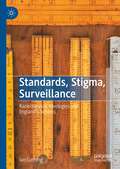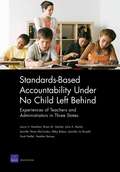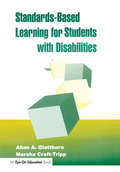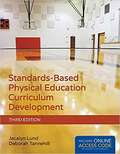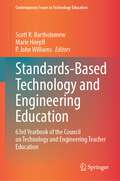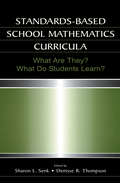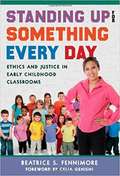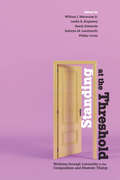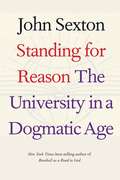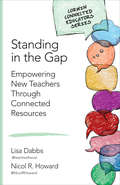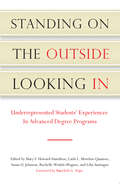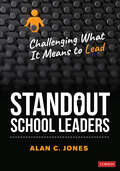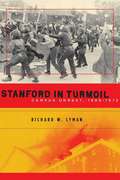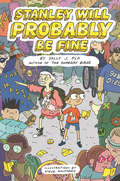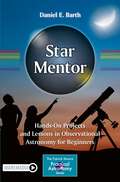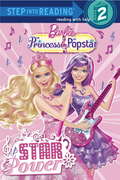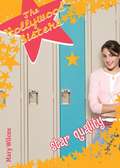- Table View
- List View
Standards, Stigma, Surveillance: Raciolinguistic Ideologies and England’s Schools
by Ian CushingThis book traces raciolinguistic ideologies in England’s schools, focusing on post- 2010 policy reforms which frame the language practices of low-income, racialised speakers as limited and deficient. Across interviews, policy mechanisms and classroom observations, the author shows how raciolinguistic ideologies are rooted in British colonial logics which continue to shape contemporary education policy. He shows how these policies require marginalised speakers to modify their speech patterns in line with normative standards of whiteness under new guises of social justice and research robustness. Finally, new visions for language education and linguistic justice are offered, demonstrating how teachers can see themselves as language activists to identify, resist and reject faults in a hostile and oppressive policy architecture. This book draws on fields including critical language policy, educational sociolinguistics, genealogy, raciolinguistics and critical language awareness.
Standards-Based Accountability Under No Child Left Behind
by Brian M. Stecher Laura S. Hamilton Jennifer Sloan Mccombs Julie A. Marsh Abby RobynSince 2001-2002, standards-based accountability provisions of the No Child Left Behind Act of 2001 have shaped the work of public school teachers and administrators in the United States. This book sheds light on how accountability policies have been translated into actions at the district, school, and classroom levels in three states.
Standards-Based Instruction and Assessment for English Language Learners
by Dr Mary Ann LachatIn increasingly diverse classrooms, an understanding of standards-based instruction and assessment for ELLs is essential for achieving both excellence and equity in our education system.
Standards-Based Learning for Students with Disabilities
by Allan Glatthorn Marsha Craft- TrippThis book describes in detail how educators can apply curriculum standards, performance standards and opportunity standards to improve education of special learners. It provides practical examples which show you how to develop and implement standards-based IEPs, use curriculum standards and benchmarks to develop long term plans, develop performance tasks for students with disabilities, and develop curriculum units for students with disabilities. This book shows you that students with disabilities can profit from and be involved with the types of standards currently used with other students.
Standards-Based Physical Education Curriculum Development
by Deborah Tannehill Jacalyn LundThe Third Edition was created around the 2014 National Standards for Physical Education for K-12 education. <p><p> Written by experts with a wealth of experience designing and implementing thematic curriculum, this innovative resource guides readers through the process of writing dynamic curriculum in physical education. The text begins by looking at the new national standards and then examines physical education from a conceptual standpoint. It goes on to examine the development of performance-based assessments designed to measure the extent of student learning and explores the various curricular models common to physical education. It delves into sport education, adventure education, outdoor education, traditional/multi-activity, fitness, and movement education, describing each model and how it links with physical education standards. <p><p> New and Key Features of the Third Edition: Includes a new Chapter 2, International Perspectives on the Implementation of Standards Includes a new Chapter 4, Building the Curriculum Includes a new Chapter 6, Creating Curricular Assessments Discusses the process of designing a standards-based curriculum by developing goals that are based on a sound philosphy Explores assessment and the importance of documenting students progress toward the standard Examines how teachers can provide students with opportunities to achieve their learning goals through challenging and motivating choices
Standards-Based Technology and Engineering Education: 63rd Yearbook of the Council on Technology and Engineering Teacher Education (Contemporary Issues in Technology Education)
by P. John Williams Scott R. Bartholomew Marie HoepflThis book brings together authors from around the world to discuss the Standards for Technological and Engineering Literacy: The Role of Technology and Engineering in STEM Education (STEL) released in July 2020 by the International Technology and Engineering Educators Association (ITEEA). The various chapters examine and elaborate on how educators must understand the structure of the standards used and their alignment with educational programs at specific levels and contexts, both in the context of the USA, and internationally. It also showcases case studies analyzing the use of standards in their various contexts from a number of countries which have either adapted STEL, or which have national Standards in Technology Education. The STEL represents a major update to the content standards that has guided the field of technology education (and, later, technology and engineering education) in the USA since 2000. In contrast to previous standards, STEL presents a substantial reduction in the number of standards and associated benchmarks, and the benchmarks have been operationalized to identify the key knowledge, skills, and dispositions associated with each standard. It also emphasizes a focus on core standards that should allow for deeper levels of understanding and engagement on the part of students, who in comprehensive educational programs will continue to revisit these core standards in increasingly sophisticated ways as they progress from Pre-K through Grade 12.
Standards-based School Mathematics Curricula: What Are They? What Do Students Learn? (Studies in Mathematical Thinking and Learning Series)
by Denisse R. Thompson Sharon L. SenkThe Curriculum and Evaluation Standards for School Mathematics published by the National Council of Teachers of Mathematics in 1989 set forth a broad vision of mathematical content and pedagogy for grades K-12 in the United States. These Standards prompted the development of Standards-based mathematics curricula. What features characterize Standards-based curricula? How well do such curricula work? To answer these questions, the editors invited researchers who had investigated the implementation of 12 different Standards-based mathematics curricula to describe the effects of these curricula on students' learning and achievement, and to provide evidence for any claims they made. In particular, authors were asked to identify content on which performance of students using Standards-based materials differed from that of students using more traditional materials, and content on which performance of these two groups of students was virtually identical. Additionally, four scholars not involved with the development of any of the materials were invited to write critical commentaries on the work reported in the other chapters. Section I of Standards-Based School Mathematics Curricula provides a historical background to place the current curriculum reform efforts in perspective, a summary of recent recommendations to reform school mathematics, and a discussion of issues that arise when conducting research on student outcomes. Sections II, III, and IV are devoted to research on mathematics curriculum projects for elementary, middle, and high schools, respectively. The final section is a commentary by Jeremy Kilpatrick, Regents Professor of Mathematics Education at the University of Georgia, on the research reported in this book. It provides a historical perspective on the use of research to guide mathematics curriculum reform in schools, and makes additional recommendations for further research. In addition to the references provided at the end of each chapter, other references about the Standards-based curriculum projects are provided at the end of the book. This volume is a valuable resource for all participants in discussions about school mathematics curricula--including professors and graduate students interested in mathematics education, curriculum development, program evaluation, or the history of education; educational policy makers; teachers; parents; principals and other school administrators. The editors hope that the large body of empirical evidence and the thoughtful discussion of educational values found in this book will enable readers to engage in informed civil discourse about the goals and methods of school mathematics curricula and related research.
Standing Out (Sweet Valley Twins #25)
by Jamie Suzanne Francine PascalSTANDING OUT. Too many changes... Billie Layton is a real tomboy. She's the only girl on the Little League softball team and the most respected athlete at Sweet Valley Middle School. But suddenly her whole world is turning upside down. First, Billie's parents are expecting a new baby and don't seem to have any time for her. Then there's her longtime friend, Jim Sturbridge, who's always been Billie's best friend, but now he seems interested only in Sally Holcomb--and Billie is jealous! Could it be that Billie likes Jim as a boyfriend and not just a buddy? Something is happening to Billie and it's very confusing! How can Elizabeth and Jessica convince Billie that she can have everything she wants?
Standing Out, Standing Together: The Social and Political Impact of Gay-Straight Alliances
by Melinda MiceliJust a decade ago, requests by students to establish groups to support gay and lesbian students were rare and generally met with shock and confusion by school administrators and local communities. Today there are more than 1600 gay straight alliances (GSAs) across the country. Standing Out, Standing Together documents the emergence of gay straight alliances in public schools across America - from factors that have contributed to the relatively rapid spread of GSA to those that stirred controversy and posed roadblocks. Using over 10 years of interviews with students, teachers, administrators and political activists; case studies; and local and national media reports, Miceli explores the personal and political stakes involved in the battles over GSAs. Although the book acknowledges and documents the harassment, abuse and problems suffered by many gay, lesbian, transgendered, and bisexual students, its primary focus is on these students as political activists, rather than as passive victims, making it a unique contribution to sociologists, educators, political activists and LGBTreaders alike.
Standing Up for Something Every Day: Ethics and Justice In Early Childhood Classrooms (Early Childhood Education)
by Beatrice S. Fennimore Sharon RyanStanding Up for Something Every Day is written for present and future teachers in the early childhood classroom who truly want to make a difference in the lives of children. Exploring some of the most complex and pressing social and ethical dilemmas confronting early childhood educators, the author provides concrete ways of addressing social justice concerns in practice. Four model teacher-guides accompany readers from chapter to chapter, and demonstrate strategies for standing up for children through ethics, respect for diversity, and commitment to advocacy. This book offers important insights, encouragement, and practical suggestions to early childhood educators who are committed to excellence and equity in their classrooms.
Standing at the Threshold: Working through Liminality in the Composition and Rhetoric TAship
by Brady Edwards Kathryn M. Lambrecht Phillip Lovas William J. Macauley Jr. Leslie AngleseyStanding at the Threshold articulates identity and role dissonances experienced by composition and rhetoric teaching assistants and reimagines the TAship within a larger professional development process. Current researchers and scholars have not fully explored the liminality of the profession’s traditional path to credentialing. This collection reconsiders these positions and their contributions to academic careers. These authors enrich the TA experience by supporting agency and self-efficacy, encouraging TAs to take active roles in understanding their positions and making the most of that experience. Many chapters are written by current or former TAs who are writing as a means of preparing, informing, and guiding new rhet/comp TAs, encouraging them to make choices about how they want to think through and participate in their teaching work. The first work on the market to delve deeply into the TAship itself and what it means for the larger discipline, Standing at the Threshold provides a rich new theorizing based in the real experiences and liminalities of teaching assistants in composition and rhetoric, approached from a productive array of perspectives. Contributors: Lew Caccia, Lillian Campbell, Rachel Donegan, Jaclyn Fiscus-Cannady, Jennifer K. Johnson, Ronda Leathers Dively, Faith Matzker, Jessica Restaino, Elizabeth Saur, Megan Schoettler, Kylee Thacker Maurer
Standing for Reason: The University in a Dogmatic Age
by John SextonA powerful case for the importance of universities as an antidote to the “secular dogmatism” that increasingly infects political discourse John Sexton argues that over six decades, a “secular dogmatism,” impenetrable by dialogue or reason, has come to dominate political discourse in America. Political positions, elevated to the status of doctrinal truths, now simply are “revealed.” Our leaders and our citizens suffer from an allergy to nuance and complexity, and the enterprise of thought is in danger. Sexton sees our universities, the engines of knowledge and stewards of thought, as the antidote, and he describes the policies university leaders must embrace if their institutions are to serve this role. Acknowledging the reality of our increasingly interconnected world—and drawing on his experience as president of New York University when it opened campuses in Abu Dhabi and Shanghai—Sexton advocates for “global network universities” as a core aspect of a new educational landscape and as the crucial foundation-blocks of an interlocking world characterized by “secular ecumenism.”
Standing for Socks
by Elissa Brent Weissman Jessica SonkinWhen Fara Ross puts on mismatched socks accidentally one morning, little does she know that it will ignite her political career. What begins as a wardrobe malfunction grows into an expression of freedom in footwear, and that can only lead to bigger things -- like the race for sixth-grade student council president. Fara knows she is perfect for the job. But as the election nears, she realizes that everyone, from her friends on her campaign team to her entire town, is paying more attention to her socks than to the issues that she stands for. All Fara wants is to serve the community. Does she have the creativity and the passion that it takes to help people see beyond her feet? Even at the cost of her friendships? Who knew that socks could spark such a revolution -- and so many problems?!
Standing in the Gap: Empowering New Teachers Through Connected Resources (Corwin Connected Educators Series)
by Lisa M. Dabbs Nicol R. HowardSupporting new teachers for success in the first years! This helpful guide will take new teachers on a journey of discovery. Learn to utilize key strategies to build confidence in the classroom and quickly get connected to resources and educators in the field who can stand in the gap to support them. You’ll learn to easily: Connect with online Communities of Practice Find and plan appropriate lessons Connect your students to classrooms around the world Collaborate with a face-to-face or virtual mentor Includes tips on building your online bio, mastering apps and hardware tools, vetting online resources, getting organized, using Twitter, Ning, Instagram, and beyond! The Corwin Connected Educators series is your key to unlocking the greatest resource available to all educators: other educators. Being a Connected Educator is more than a set of actions: it’s a belief in the potential of technology to fuel lifelong learning. "This book gives teachers the resources to lead their students into this global community. The authors represent the growing body of educators who recognize that social media gives power, not problems, to students’ learning." Angela Maiers, Founder and President Choose2Matter, Inc. and Maiers Education Services, Inc. "This is a stellar exploration of what collaboration and communication can look like in modern education and how it can enhance all aspects of school. . A must read for those wishing to maximize digital tools to increase communication and collaboration with all educational stakeholders." Adam Bellow, Educational Consultant and Corwin Author, Untangling the Web
Standing in the Gap: Empowering New Teachers Through Connected Resources (Corwin Connected Educators Series)
by Lisa M. Dabbs Nicol R. HowardSupporting new teachers for success in the first years! This helpful guide will take new teachers on a journey of discovery. Learn to utilize key strategies to build confidence in the classroom and quickly get connected to resources and educators in the field who can stand in the gap to support them. You’ll learn to easily: Connect with online Communities of Practice Find and plan appropriate lessons Connect your students to classrooms around the world Collaborate with a face-to-face or virtual mentor Includes tips on building your online bio, mastering apps and hardware tools, vetting online resources, getting organized, using Twitter, Ning, Instagram, and beyond! The Corwin Connected Educators series is your key to unlocking the greatest resource available to all educators: other educators. Being a Connected Educator is more than a set of actions: it’s a belief in the potential of technology to fuel lifelong learning. "This book gives teachers the resources to lead their students into this global community. The authors represent the growing body of educators who recognize that social media gives power, not problems, to students’ learning." Angela Maiers, Founder and President Choose2Matter, Inc. and Maiers Education Services, Inc. "This is a stellar exploration of what collaboration and communication can look like in modern education and how it can enhance all aspects of school. . A must read for those wishing to maximize digital tools to increase communication and collaboration with all educational stakeholders." Adam Bellow, Educational Consultant and Corwin Author, Untangling the Web
Standing on the Outside Looking In: Underrepresented Students' Experiences in Advanced Degree Programs
by Mary F. Howard-Hamilton Rachelle Winkle-Wagner Carla L. Morelon-Quainoo Susan D. Johnson Lilia SantiagueCompared to the literature on the impact of post-secondary institutions on undergraduate institutions, the literature on the academic experiences of graduate students from underrepresented populations is comparatively meager.This book remedies this gap by gathering a rich collection of personal narratives and empirical research to provide a comprehensive account of the actual lived experiences of graduate students of color and their perception of the campus climate.This volume examines issues of access, retention, and transition; and explores the personal experiences of students of color in advanced-degree programs. The contributors cover issues such as financial aid; the culture, mission and racial climate at doctoral granting institutions; the transitional challenges STEM undergraduates face on entering graduate programs; mentoring; the distinct concerns and challenges that African, Asian and Latina/o students encounter in doctoral and professional programs; and the need to acknowledge and support their spirituality.Franklin Tuitt concludes the book by summarizing the issues raised, and making recommendations to faculty, administrators, and directors of graduate programs about what they can do to promote the well-being and success of graduate students of color.
Standout School Leaders: Challenging What It Means to Lead
by Alan C. JonesBridge the gap between managing well and leading for impact. In this must-read guide for education leaders, Alan C. Jones expertly distinguishes between Administrators Good at their Jobs (AGJs) and Standout School Leaders (SSLs) by exploring the qualities that make select leaders truly exceptional. While AGJs focus on maintaining effective school operations, SSLs address the gaps within institutional systems to create environments that foster genuine learning and growth, balance institutional demands with innovative educational approaches, and align day-to-day operations with the deeper mission of schooling. You’ll find chapter openers that contrast how SSLs and AGJs approach fundamental administrative functions and closing questions to support personal reflection and application of the concept at your school site. Additional features include: Vignettes that illustrate daily challenges faced by administrators and contrasting leadership responses SSL Tips to offer insights into how SSLs think differently about schooling goals End-of-Chapter Resources to deepen understanding of key concepts Jones empowers education leaders with the knowledge and tools to integrate innovative practices into their roles. Whether you′re a principal, department head, or district leader, this book provides the guidance needed to transition from managing to leading by fostering environments where both educators and students can thrive.
Standout School Leaders: Challenging What It Means to Lead
by Alan C. JonesBridge the gap between managing well and leading for impact. In this must-read guide for education leaders, Alan C. Jones expertly distinguishes between Administrators Good at their Jobs (AGJs) and Standout School Leaders (SSLs) by exploring the qualities that make select leaders truly exceptional. While AGJs focus on maintaining effective school operations, SSLs address the gaps within institutional systems to create environments that foster genuine learning and growth, balance institutional demands with innovative educational approaches, and align day-to-day operations with the deeper mission of schooling. You’ll find chapter openers that contrast how SSLs and AGJs approach fundamental administrative functions and closing questions to support personal reflection and application of the concept at your school site. Additional features include: Vignettes that illustrate daily challenges faced by administrators and contrasting leadership responses SSL Tips to offer insights into how SSLs think differently about schooling goals End-of-Chapter Resources to deepen understanding of key concepts Jones empowers education leaders with the knowledge and tools to integrate innovative practices into their roles. Whether you′re a principal, department head, or district leader, this book provides the guidance needed to transition from managing to leading by fostering environments where both educators and students can thrive.
Stanford Wong Flunks Big-Time
by Lisa YeeStanford Wong is having a bad summer. If he flunks his summer-school English class, he won't pass sixth grade. If that happens, he won't start on the A-team. If *that* happens, his friends will abandon him and Emily Ebers won't like him anymore. And if THAT happens, his life will be over. Then his parents are fighting, his grandmother Yin-Yin hates her new nursing home, he's being "tutored" by the world's biggest nerdball Millicent Min--and he's not sure his ballpoint "Emily" tattoo is ever going to wash off. (cont. on next page)
Stanford in Turmoil
by Richard W. LymanStanford in Turmoilis a rare insider's look at one school's experience of dramatic political unrest during the late 1960s and early 1970s. It provides a unique perspective on the events that roiled the campus during this period-a period in which the author, Richard Lyman, served as the university's vice president, provost, and then president. In a cross between memoir and history, the book guides us through major cases of arson, including the destruction of the president's office, the notorious "Cambodia Spring" of 1970-when dozens of students and police were injured-and the forced resignation of another Stanford president after just nineteen months in office. Remarkably, Stanford's prestige and academic strength grew unabated throughout this time of crisis. How this came to pass is the central theme ofStanford in Turmoil.
Stanley Will Probably Be Fine
by Steve Wolfhard Sally J. PlaThis funny and moving second novel from the author of The Someday Birds features comic trivia, a safety superhero, and a super-cool scavenger hunt all over downtown San Diego, as our young hero Stanley Fortinbras grapples with his anxiety—and learns what, exactly, it means to be brave.Nobody knows comics trivia like Stanley knows comics trivia.It’s what he takes comfort in when the world around him gets to be too much. And after he faints during a safety assembly, Stanley takes his love of comics up a level by inventing his own imaginary superhero, named John Lockdown, to help him through. Help is what he needs, because Stanley’s entered Trivia Quest—a giant comics-trivia treasure hunt—to prove he can tackle his worries, score VIP passes to Comic Fest, and win back his ex-best friend. Partnered with his fearless new neighbor Liberty, Stanley faces his most epic, overwhelming, challenging day ever. What would John Lockdown do?Stanley’s about to find out.
Stanley the Dog: The First Day of School
by Bobby BonesFrom the award-winning radio and TV personality and beloved two-time New York Times bestselling author Bobby Bones, Stanley the Dog: The First Day of School is a hilarious and heartfelt new picture book about a bulldog pup named Stanley and his adventures on the first day of school. Today is Stanley’s first day of school—and he really doesn’t want to go. Stanley would rather dawdle in bed and dither over which collar to wear than get on the school bus. With his stomach turning into tighter knots by the minute, Stanley’s worried whether a bulldog like him will ever fit in with the other pups at school.For one thing, Stanley doesn’t know any of the school rules. He rolls when he’s supposed to sit. Barks when he’s supposed to stay. And worst of all, he doesn’t know how to make friends. But when disaster strikes, maybe all Stanley needs to do is be himself in order save the day?Illustrated with hilariously loving detail by Stephanie Laberis and inspired by Bobby Bones’s own real-life bulldog puppy, Stanley the Dog: The First Day of School will remind every reader about the challenges of trying new things and the value of staying true to yourself.
Star Mentor: Hands-On Projects and Lessons in Observational Astronomy for Beginners (The Patrick Moore Practical Astronomy Series)
by Daniel E. BarthThis is a hands-on guide for both the budding astronomer in need of a mentor and the seasoned observer who wants to learn how to effectively share their knowledge with newcomers.Through decades of teaching observational astronomy at the high school and college level, Dr. Daniel E. Barth has inspired thousands of beginners, and in this book he shares the many ways that you can learn and teach others, too. The chapters contain a plethora of practical projects in observational astronomy that can be done on your own or with others, delighting any hobbyist with the many wonders of the night sky.The activities are tailored for different skill levels, always starting from the basics and working their way up to more challenging tasks. They can be done outdoors with a telescope or indoors with a few simple materials, depending on the sky conditions and time of year. Make astronomy fun for all with these engaging DIY projects, which include step-by-step instructions for modeling, sketching, observing, recording, and many other interactive exercises. Appropriate for the amateur who wants to teach their passion, the beginner who has their very first telescope, the binocular owner, and even those who do not yet own equipment, Star Mentor is your guide to forming and sharing a lifelong love for astronomy.
Star Power (Barbie)
by Mary Man-Kong Random HouseThis Step 2 reader retells Barbie's latest direct-to-DVD film release. It's perfect for girls ages 4-6 who are just learning to read.
Star Quality (The Hollywood Sisters #4)
by Mary WilcoxFashionista. Comedian. Thief? Brand-new school, brand-new me? Try again. Having a famous sister doesn't make me special at my posh Beverly Hills academy. But I am getting a lot of attention. Photos are disappearing faster than MTV swag bags from my classmates' lockers-and blaming the new girl is the reaction du jour. I can't bother my almost-boyfriend Jeremy with my problems -- and solving Project Photo Frame-Up is only one of them. The rest of my schedule: convincing my friends that I'm not a kleptomaniac, helping Eva nail her Serious Actress audition, and doing Jeremy a favor that makes my brain hurt. Is a Hollywood ending in sight? Not. Even. Close.
